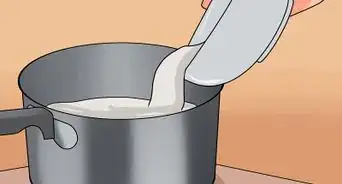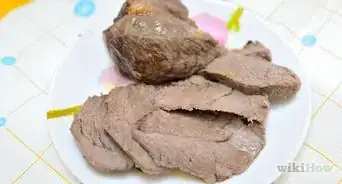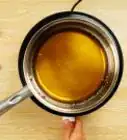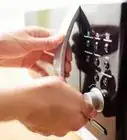wikiHow is a “wiki,” similar to Wikipedia, which means that many of our articles are co-written by multiple authors. To create this article, 14 people, some anonymous, worked to edit and improve it over time.
This article has been viewed 327,164 times.
Learn more...
Do you like to fry food but don't because the cost of fresh cooking oil is too high? One of the best things about frying is that the oil can be used more than once and used oil can add flavor. Don't worry about the cost of expensive "professional" or "industrial" oil filters. Here is how to do it on the cheap.
Steps
-
1When you are done frying for the day, scoop out any large chunks that are left in the oil.[1]
-
2Allow the oil to cool to 150 - 170 °F, 65 - 75 °C.[2]Advertisement
-
3Place a coffee filter or a cheesecloth in the mason jar and roll the edge of the filter over the lip of the jar.
-
4Loosely install just the ring and make snug to secure the paper coffee filter or cheesecloth.
-
5Pour the warm oil into the filter through the hole in the ring being careful not to overfill the filter. It will take a few minutes for the oil to pass through. Caution, the oil is still hot enough to cause a burn.[3]
-
6When the oil has run through the filter, carefully remove the ring and filter. Discard the filter, place the lid on the jar and secure with the ring.
-
7Store your oil for your next cooking adventure, be it deep frying, stir frying, pan seasoning or just lubricant duty.[4]
-
8Finished.
Community Q&A
-
QuestionWhat is the increase of oil life if filtered daily?
 BozobubCommunity AnswerIt's best to filter after each use, if possible, rather than daily, if you fry more than once a day. Frying for longer times reduces the lifespan of the oil, but you could see 5 - 10x the life of the oil through filtering.
BozobubCommunity AnswerIt's best to filter after each use, if possible, rather than daily, if you fry more than once a day. Frying for longer times reduces the lifespan of the oil, but you could see 5 - 10x the life of the oil through filtering. -
QuestionWhat are some scientific explanations about this purification of oil?
 BozobubCommunity AnswerIt's just removing matter from frying that can continue to cook, then burn, ruining the oil for later use. It's simply the science of filtering out particulates.
BozobubCommunity AnswerIt's just removing matter from frying that can continue to cook, then burn, ruining the oil for later use. It's simply the science of filtering out particulates. -
QuestionUsing this method never worked for me. The standard coffee filter always ended up clogged by the oil, even when there were almost no food particles in the oil. Why?
 Logic Johnson LafontaineTop AnswererMy money is on oil temperature being too low. The oil might be too thick, so it's easier to get trapped in the filter.
Logic Johnson LafontaineTop AnswererMy money is on oil temperature being too low. The oil might be too thick, so it's easier to get trapped in the filter.
Warnings
- Be very careful handling hot oil. Even 150 °F / 65 °C oil can cause a burn in seconds.⧼thumbs_response⧽
Things You'll Need
- Mason jar with ring and lid
- Coffee filters
- Cheesecloth
References
- ↑ https://www.seriouseats.com/2013/09/ask-the-food-lab-how-many-times-can-i-reuse-fry-oil.html
- ↑ https://www.bonappetit.com/test-kitchen/how-to/article/leftover-frying-oil
- ↑ https://www.bonappetit.com/test-kitchen/how-to/article/leftover-frying-oil
- ↑ https://www.bonappetit.com/test-kitchen/how-to/article/leftover-frying-oil
- https://www.epicurious.com/expert-advice/you-can-reuse-frying-oil-article
- https://www.fsis.usda.gov/wps/wcm/connect/65f762d0-e4d0-4278-b5cb-2836854a3eda/Deep_Fat_Frying.pdf?MOD=AJPERES
About This Article
To filter fry oil for reuse, start by scooping out any large chunks of food from the oil and then letting the oil cool to 150-170 degrees Fahrenheit. Next, secure a coffee filter or cheesecloth over the top of a jar and pour the warm oil into it. Then, after you add the oil, wait a few minutes for it to filter into the jar. Finally, remove the filter, seal the jar, and set it aside for the next time you want to fry food. To learn how to secure a coffee filter or cheesecloth to a jar lid, scroll down!

















































